-
The BladeForums.com 2024 Traditional Knife is available! Price is $250 ea (shipped within CONUS).
Order here: https://www.bladeforums.com/help/2024-traditional/
You are using an out of date browser. It may not display this or other websites correctly.
You should upgrade or use an alternative browser.
You should upgrade or use an alternative browser.
Random Thought Thread
- Thread starter Nathan the Machinist
- Start date
Nathan the Machinist
KnifeMaker / Machinist / Evil Genius
Moderator
Knifemaker / Craftsman / Service Provider
- Joined
- Feb 13, 2007
- Messages
- 18,692
^ holy shit
- Joined
- Apr 11, 2016
- Messages
- 23,605
Damn...how many of those things do you have? Or are you reusing them?
- Joined
- May 29, 2004
- Messages
- 25,087
Damn...how many of those things do you have? Or are you reusing them?
There will be soooo much googleying...

It was a 1500 piece assortment
Nathan the Machinist
KnifeMaker / Machinist / Evil Genius
Moderator
Knifemaker / Craftsman / Service Provider
- Joined
- Feb 13, 2007
- Messages
- 18,692
Nathan the Machinist
KnifeMaker / Machinist / Evil Genius
Moderator
Knifemaker / Craftsman / Service Provider
- Joined
- Feb 13, 2007
- Messages
- 18,692
Nathan the Machinist
KnifeMaker / Machinist / Evil Genius
Moderator
Knifemaker / Craftsman / Service Provider
- Joined
- Feb 13, 2007
- Messages
- 18,692
Yeah, there's absolutely no purpose served being dead nuts, but hey....Dead on 3/16"!
mb>
Gold Member
- Joined
- Sep 24, 2014
- Messages
- 3,805
In my world, AA comes after Z. 5-axis machine (XYZ45)?
Nathan the Machinist
KnifeMaker / Machinist / Evil Genius
Moderator
Knifemaker / Craftsman / Service Provider
- Joined
- Feb 13, 2007
- Messages
- 18,692
Nathan the Machinist
KnifeMaker / Machinist / Evil Genius
Moderator
Knifemaker / Craftsman / Service Provider
- Joined
- Feb 13, 2007
- Messages
- 18,692
Naw it's just a 3In my world, AA comes after Z. 5-axis machine (XYZ45)?
Benson X
Gold Member
- Joined
- Mar 1, 2016
- Messages
- 855
I'm in Washington (Olympia), but the photo was taken in Eagle's Cove on the southern point of San Juan Island.Benson X , moving my response over here since it is off topic.
What part of the PNW are you in? I just ask because I know that I personally have seen goose neck barnacles in archaeological deposits going back a couple thousand years in Oregon. I don't actually know off the top of my head where the cutoff has traditionally been for them. If you are further north, it would be worth my time to look into their range so that I can figure out if they are a useful climate proxy.
I asked a "Marine Biologist" on the island what type of barnacle they are, as I'd never seen them before. She told me they are Goose Barnacles, or Gooseneck Barnacles, and they are not native to our region - but I failed to ask what made her assume they are not native. She's the expert, so I just took her word for it.
There are 2 common species:
Pollicipes Pollicipes (most common in Northern Spain and neighboring coastal countries)
Pollicipes Polymerus (NE Pacific Ocean native, from California to southern Alaska)
I did a bit more research last night and learned the Pollicipes Pollicipes are historically popular in Spain as a delicacy, and commonly sourced from the Galician region. There was a company that was importing them from Spain to the US and they had an interesting excerpt on their website:
"While fresh percebes are not available in the U.S. from Galician sources, we recently discovered a source sustainably harvested in Oregon. The wave-battered rocky coast of Oregon is strikingly similar to the coast of Galicia – it is even the nearly the same latitude. Waves from the Pacific smash into the rocks of the area, bathing the percebes in cool, fresh, nutrient rich sea water - creating a habitat much like the one found in Galicia."
I guess our Pollicipes Polymerus species is not considered as palatable, or as delicious as their European cousins for whatever reason.
Here's another link that has some good info. about them:
https://web.archive.org/web/2012021...illopoda/Cirripedia/Pollicipes_polymerus.html
- Joined
- Mar 20, 2016
- Messages
- 14,394
Snip...
... I'm a machinist not a carpenter...
Can an orthopedic surgeon be a carpenter? Can a carpenter be an ortho surgeon in a pinch?
Well... there is this chiropractor who works on wood using sharp tools...Can an orthopedic surgeon be a carpenter? Can a carpenter be an ortho surgeon in a pinch?
- Joined
- Mar 20, 2016
- Messages
- 14,394
Bleechhhh...tequila
I'll feed you 21 year old single malt
I sh*t you not, but instead of malt I read something else at first!
- Joined
- May 29, 2004
- Messages
- 25,087
That's all on youI sh*t you not, but instead of malt I read something else at first!
Last edited:
Nathan the Machinist
KnifeMaker / Machinist / Evil Genius
Moderator
Knifemaker / Craftsman / Service Provider
- Joined
- Feb 13, 2007
- Messages
- 18,692
Random thought: I think it would be nice if I could replace the cycle finish alarm on the machine center with a squeaky toy like a rubber chicken
- Joined
- Mar 20, 2016
- Messages
- 14,394
^ I see that Evil Genius descriptive up there so apply it to a screeching rubber chicken 
Lol. Reminds me of the first time I encountered someone doing this in the Import Tuner scene a couple decades agoRandom thought: I think it would be nice if I could replace the cycle finish alarm on the machine center with a squeaky toy like a rubber chicken





